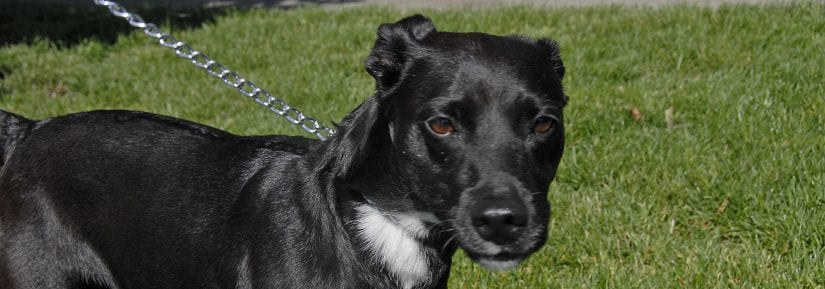Question: My dog pulls me down the street on his leash and is very unruly. A friend suggested a prong or choke collar. Would that help?
Like most things in life, when you cut corners it usually comes back to bite you. Despite the bad pun, using prong, choke or especially shock collars may actually cause your dog to become either fearful or aggressive.

These devices are designed to administer correction for behaviours we don’t want to see, such as pulling. There are two major downsides to these tools. The first is the most obvious; they are designed to cause a physical punishment or threat of punishment to the dog. Choke collars can cause injury to the trachea and nerve damage. Worse, prong collars can literally dig into a dog’s skin and shock collars can cause burns. Learn more about choosing the right collar.
Secondly, these devices can cause long-term psychological distress to your dog that will inhibit a strong, positive bond with your companion.
The fear of punishment can have side-effects such as redirected aggression or lack of trust by the dog. Also, dogs who might ordinarily be friendly but have endured negative experiences related to their collars may react aggressively if someone touches them around the neck area. This can be particularly dangerous for children or for veterinarians trying to handle your dog to perform tasks your dog may already be feeling uneasy about.
Further, punishment devices actually inhibit learning. Repetitive corrections can lead to a fear response from the dog. While on leash they live in constant fear they may be punished, yet may not understand what exactly the behaviour is that is causing the correction.
The BC SPCA supports and promotes force-free training methods. Training should focus on positively reinforcing desired behaviours. A trainer that applies force-free methods and positive reinforcement can help identify ways to redirect your dog’s focus so he no longer pulls. She will also help identify if you are actually inadvertently contributing to the pulling through unintended reinforcement.

The dog may be getting mixed messages from being allowed to pull sometimes but not others. As well, guardians have to evaluate the emotional state of their dogs which may be contributing to pulling. If your dog is only getting occasional walks the dog might be pulling to extend the walk or he may be pulling to get to a desired place, like the off-leash park.
Lastly, there are lots of humane collars that your trainer or knowledgeable pet supply store staff can recommend and help fit to help you as part of an overall training program for your dog.
For more tips on dog care and behaviour, check out our dog pet care section. Need a dog trainer? Learn about AnimalKind dog training.
Get updates from the BC SPCA
Want to receive more pet care tips like this, right in your inbox? Use the form below to subscribe for updates.
